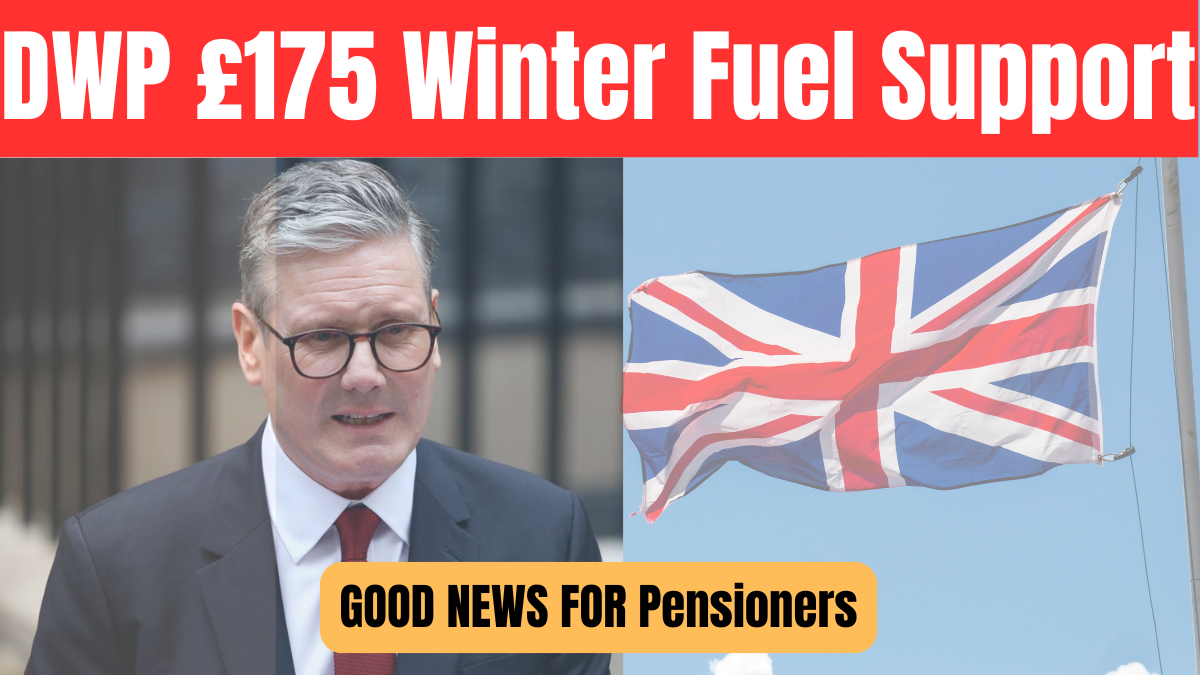The Department for Work and Pensions (DWP) has introduced a means-tested approach for Winter Fuel Payments, restricting eligibility to only those receiving means-tested benefits.
Under this revised system:
- Pensioners on means-tested benefits (such as Pension Credit, Universal Credit, or Income Support) will still receive Winter Fuel Payments.
- Pensioners not receiving means-tested benefits will no longer qualify.
This change aims to redirect financial assistance toward the lowest-income retirees, but it has raised concerns about middle-income pensioners who may now struggle with heating costs.

What Is the £175 Winter Fuel Support Payment?
To offset the impact of these changes, the DWP has introduced a £175 support payment for pensioners who no longer qualify for the Winter Fuel Payment.
This one-time payment is designed to provide temporary relief for those who may now face higher heating bills during winter.
| Support Measure | Details |
|---|---|
| £175 One-Time Payment | For pensioners affected by Winter Fuel Payment policy changes. |
| Eligibility | Middle-income pensioners who previously received Winter Fuel Payments but do not qualify under the new means-tested system. |
| Disbursement Date | Payments will begin in December 2025. |
| Payment Method | Direct deposit or mailed cheque. |
Who Qualifies for the £175 Winter Fuel Support?
To be eligible for the £175 Winter Fuel Support, pensioners must meet the following criteria:
- Be aged 66 or older by September 2025.
- Have previously received Winter Fuel Payments but do not qualify under the new means-tested system.
- Live in the UK for at least 26 weeks in the qualifying year.
- Not be receiving Pension Credit, Income Support, or Universal Credit.
These conditions ensure that middle-income pensioners—who previously benefited but are now excluded from the main scheme—still receive some financial assistance.
How and When Will the £175 Payment Be Issued?
The £175 Winter Fuel Support will be disbursed in December 2025, aligning with the traditional Winter Fuel Payment schedule.
| Payment Method | Details |
|---|---|
| Direct Deposit | Funds will be automatically deposited into eligible pensioners’ bank accounts. |
| Mailed Cheque | Those not registered for direct deposit will receive a cheque by the end of December 2025. |
Pensioners should check and update their banking details through My Pension Service Account to avoid any delays in receiving their payments.
Why Did the Government Introduce Means-Testing for Winter Fuel Payments?
The government introduced means-testing to prioritize financial assistance for the lowest-income pensioners while addressing the country’s budget deficit.
According to Pensions Minister Liz Kendall:
- The government inherited a £22 billion fiscal deficit, requiring cost-cutting measures.
- Financial cuts were necessary to ensure long-term economic stability.
- Prioritizing support for low-income pensioners was the main objective.
Despite these explanations, many advocacy groups argue that the policy disadvantages middle-income pensioners, who still face rising energy costs but now receive less support.
What Other Government Support Is Available?
While the Winter Fuel Payment changes have reduced eligibility, the government has introduced alternative assistance programs for pensioners struggling with energy costs.
| Government Support Program | Details |
|---|---|
| Warm Home Discount | A £150 annual discount on electricity bills for low-income pensioners. |
| Cold Weather Payment | £25 per week during severe winter temperatures. |
| Household Support Fund | Financial aid for low-income pensioners to cover energy costs and essentials. |
These programs offer some relief, but many middle-income pensioners may still struggle with heating costs during winter.
Concerns Over the Impact on Pensioners
Despite the £175 support payment, many experts warn that thousands of pensioners could face financial difficulties due to:
- Energy price volatility, leading to higher household bills.
- Middle-income pensioners being excluded from government support programs.
- No guarantee of future assistance beyond 2025.
MPs and pensioner advocacy groups continue to urge the government to reassess the policy and consider additional financial relief programs.
Frequently Asked Questions (FAQs)
1. Who qualifies for the £175 Winter Fuel Support Payment?
Pensioners who previously received Winter Fuel Payments but do not qualify under the new means-tested system will receive £175 in December 2025.
2. How will the £175 payment be issued?
The payment will be automatically deposited into eligible pensioners’ bank accounts. Those who receive payments by cheque will receive their funds by the end of December 2025.
3. Why did the government change the Winter Fuel Payment eligibility?
The government introduced means-testing to prioritize financial aid for low-income pensioners and address the UK’s £22 billion fiscal deficit.
4. Will pensioners receiving Pension Credit still get the full Winter Fuel Payment?
Yes. Pensioners receiving means-tested benefits such as Pension Credit, Income Support, and Universal Credit will continue receiving full Winter Fuel Payments.
5. What other financial aid is available for pensioners?
The UK government provides other assistance programs, including:
- Warm Home Discount (£150 annual discount)
- Cold Weather Payments (£25 per cold week)
- Household Support Fund for struggling pensioners
6. Will the £175 payment be offered every year?
At this time, the £175 support payment is a one-time measure for December 2025. The government has not confirmed whether it will continue beyond this year.
7. How can pensioners check if they qualify for other benefits?
Pensioners can visit GOV.UK or contact the Pension Service helpline to check eligibility for financial aid programs.
Click here to know more.
Aanchal is a passionate writer with a keen interest in storytelling, content creation, and creative expression. She enjoys exploring diverse topics and crafting engaging narratives that captivate readers.
